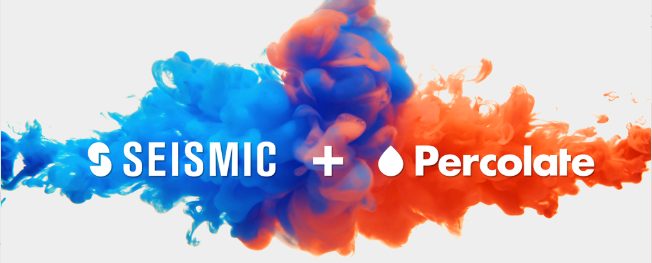Sales enablement automation (SEA) vendor Seismic announced its acquisition of content marketing platform (CMP) Percolate yesterday at its annual customer event, Seismic Shift. The San Diego-based unicorn adds 50 engineers to the business, increases its presence in New York City, and expands its footprints in Denver and San Francisco.
The acquisition improves Seismic’s position with marketers, who Forrester predicts will take on a more active role in overseeing sales enablement in 2020.
If you’re already a marketer using Seismic, this’ll be a big positive but one you’ll only really feel in a year or more, once Percolate’s fully integrated into Seismic. What you’ll gain are some of the market’s best content calendaring and campaign workflow capabilities, which were weak spots in our analysis of Seismic’s own content offering.
For those marketers using Seismic and another CMP, there’s no big downside, as Seismic’s sure to continue supporting external integrations. But over time, Seismic’s sure to build up new and interesting native capabilities where its traditional offering and Percolate’s intersect, such as how sales analytics feeds into content development, automation of sales content assembly based on performance, and enhanced ticketing of content from sales teams.
Our most recent analysis of Percolate indicated that — despite a relatively strong product — its growth trajectory had stalled. As its focus moved from consumer to more B2B use cases, the affinity with platforms such as Seismic was inevitable. And existing B2B clients of Percolate will surely be happy that their platform is on a solid new footing with strategic owners. Any B2B marketers using Percolate who don’t already have sales enablement technology are going to get a hasty introduction, one that’ll likely be welcome; enterprise businesses waste $1 million or more per year making content that sales won’t touch.
This is the second major acquisition of a CMP by a larger technology company supporting B2B marketers, after Upland Software bought Kapost for $50 million in May this year. And it is unlikely to be the last. The perennial challenge for CMPs (and one we’ve discussed at length before) was that the back-office efficiencies of a CMP were hard to justify independent of where the content was published. So we’re seeing CMPs get absorbed or developed entirely within channel-specific technologies (such as sales or social) and then — protected by that clear benefit — extend to support and orchestrate other channels.
At least one CMP CEO believes that a back-office-focused offering can succeed but also sees it in the context of merging into the marketing resource management (MRM) space (which Percolate had also done to some success). Notably, this MRM space has been its own slow growth story, which further cements a thesis that many marketing organizations still don’t value operational efficiencies around content — or at least not enough to justify a large martech investment; many still want their agencies to sweat that stuff.
Conclusion: If you’re a marketer considering technology to support sales or marketing experiences, the combined Seismic and Percolate offering will be compelling, if a year or so away.
